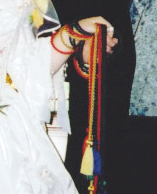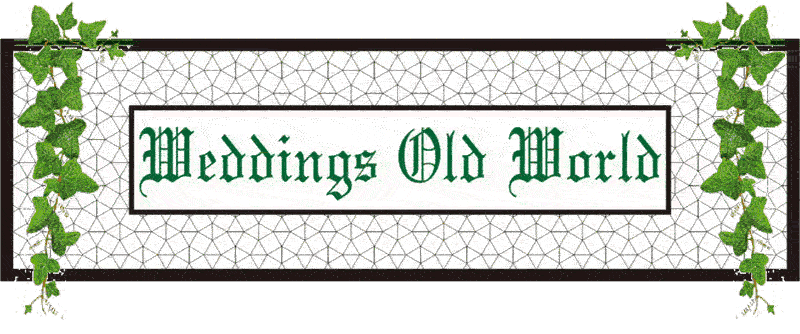|
Rev. Lisa Dawn
also performs Handfasting
Ceremonies.
 The
information below was taken from Wikipedia: The
information below was taken from Wikipedia:
Handfasting is
a Traditional Celtic ceremony of (temporary
or permanent) betrothal or wedding.
The term is derived from the verb to handfast,
used in Middle to Early Modern English for
the making of a contract of marriage.
In the present day, some Neopagans practice
this ritual. The marriage vows taken may be
for "a year and a day", a lifetime, "for all
of eternity" or "for as long as love shall
last". Whether the ceremony is legal, or a
private spiritual commitment, is up to the
couple. Depending on the state where the
handfasting is performed, and whether or not
the officiant is a legally recognized
minister, the ceremony itself may be legally
binding, or couples may choose to make it
legal by also having a civil ceremony. Modern
handfastings are performed for heterosexual
or homosexual couples. Currently, handfasting
is a legal Pagan wedding ceremony in
Scotland, but not in England, Wales or
Ireland.
As with many Neopagan rituals, some groups
may use historically attested forms of the
ceremony, striving to be as traditional as
possible, while others may use only the basic
idea of handfasting and largely create a new
ceremony.
As many different traditions of Neopaganism
use some variation on the handfasting
ceremony, there is no universal ritual form
that is followed, and the elements included
are generally up to the couple being
handfasted. In cases where the couple belong
to a specific religious or cultural
tradition, there may be a specific form of
the ritual used by all or most members of
that particular tradition. The couple may
conduct the ceremony themselves or may have
an officiant perform the ceremony. In some
traditions, the couple may jump over a broom
at the end of the ceremony. Some may instead
leap over a small fire together. Today, some
couples opt for a handfasting ceremony in
place of, or incorporated into, their public
wedding. As summer is the traditional time
for handfastings, they are often held
outdoors.
A corresponding divorce ceremony called a
handparting is sometimes practiced. In a
Wiccan handparting, the couple may jump
backwards over the broom before parting
hands. [citation needed]
As with more conventional marriage
ceremonies, couples often exchange rings
during a handfasting, symbolizing their
commitment to each other. Many couples choose
rings that reflect their spiritual and
cultural traditions, while others choose
plainer, more conventional wedding rings.
|
